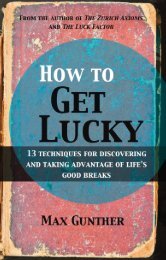to view PDF - Harriman House
to view PDF - Harriman House
to view PDF - Harriman House
You also want an ePaper? Increase the reach of your titles
YUMPU automatically turns print PDFs into web optimized ePapers that Google loves.
How<br />
To<br />
Get Lucky<br />
H<br />
13 techniques for discovering and taking<br />
advantage of life’s good breaks<br />
J<br />
by<br />
Max Gunther
Contents<br />
Edi<strong>to</strong>r’s Note<br />
vii<br />
Part 1 – The Commanding Fac<strong>to</strong>r 1<br />
The Supreme Insult 3<br />
The Fact That Nobody Talks About 7<br />
Part 2 – Techniques of Lucky Positioning 13<br />
The First Technique: Making the Luck/Planning Distinction 17<br />
The Second Technique: Finding the Fast Flow 33<br />
The Third Technique: Risk Spooning 45<br />
The Fourth Technique: Run Cutting 65<br />
The Fifth Technique: Luck Selection 75<br />
The Sixth Technique: The Zigzag Path 83<br />
The Seventh Technique: Constructive Supernaturalism 91<br />
The Eighth Technique: Worst-Case Analysis 103<br />
The Ninth Technique: The Closed Mouth 111<br />
The Tenth Technique: Recognizing a Nonlesson 125<br />
The Eleventh Technique: Accepting an Unfair Universe 133<br />
The Twelfth Technique: The Juggling Act 145<br />
The Thirteenth Technique: Destiny Pairing 157<br />
Getting Lucky: Putting the Thirteen Techniques Together 167<br />
v
Part I<br />
The Commanding Fac<strong>to</strong>r
The Supreme Insult<br />
W<br />
illiam S. Hoffman was a gambler but not a successful one.<br />
He wrote a book about his life entitled The Loser. Trying <strong>to</strong><br />
sort out the reasons why he was never able <strong>to</strong> make it, he arrived<br />
at a very interesting conclusion: He failed because he tried <strong>to</strong> deny<br />
the role of luck in his life.<br />
He had learned this unproductive and dangerous attitude from<br />
his father, an athletic coach. The senior Hoffman liked <strong>to</strong> pep talk<br />
his teams with windy pronouncements derived from the Work<br />
Ethic. One of his favorites was: “If you’re good, you don’t need<br />
luck.”<br />
What nonsense.<br />
Of course you need luck. It doesn’t matter how good a football<br />
player you are. If you have the bad luck <strong>to</strong> trip on a loose stair<br />
runner and sprain your ankle the night before the big game, none<br />
of your hard-earned strengths and skills are going <strong>to</strong> do you the<br />
least bit of good. All those hours or practice, all that admirable<br />
grit and determination – all are down the drain. The coach can<br />
recite Work Ethic apothegms at you until he is blue in the face, but<br />
he cannot change the facts.<br />
It isn’t enough just <strong>to</strong> be good. You’ve got <strong>to</strong> be lucky, <strong>to</strong>o.<br />
The junior Hoffman, the gambler, evidently listened <strong>to</strong>o seriously<br />
<strong>to</strong> his father’s bad advice. He thought he could become a successful<br />
gambler through sheer hard work. All he had <strong>to</strong> do, young<br />
Hoffman believed, was apply himself <strong>to</strong> an assiduous study of<br />
horses, cards, or dice. “If you’re good, you don’t need luck.”<br />
Having become good, he figured, he would be in a position <strong>to</strong><br />
conquer the world.<br />
3
How To Get Lucky, by Max Gunther<br />
That was what he thought. Things didn’t work according <strong>to</strong><br />
plan. Bad luck hit him. He wasn’t prepared <strong>to</strong> handle it. He went<br />
broke.<br />
You have got <strong>to</strong> have good luck. Without it, nothing will work<br />
right for you. Good luck is the essential basic component of<br />
success, no matter what your personal definition of “success” may<br />
be.<br />
What is it you want from life? To be rich? Famous? Respected<br />
in a profession? Happily married? Well loved? Whatever your<br />
goals may be, have you achieved them? It is unlikely you would be<br />
reading this book if your answer were yes.<br />
Nearly all of us would have <strong>to</strong> answer no, we have not yet<br />
achieved our goals. And why not? Apply the question <strong>to</strong> your own<br />
life. What is it that has prevented you from getting where you want<br />
<strong>to</strong> be? Is it that you aren’t good enough? Or simply that you<br />
haven’t been lucky enough?<br />
The second answer – not lucky enough – is by far the more likely<br />
<strong>to</strong> be the truth. Most of us are “good” in one way or another –<br />
good enough, as often as not, <strong>to</strong> reach whatever goals we have<br />
wished <strong>to</strong> set for ourselves. We have failed <strong>to</strong> reach those goals<br />
largely because of a lack of luck.<br />
There are any number of ways <strong>to</strong> demonstrate this truth <strong>to</strong><br />
yourself. It was emphasized strongly for me during a recent period<br />
when, quite by chance, I went <strong>to</strong> see a series of plays performed by<br />
amateur theatrical groups in my home county. Many of the groups’<br />
members <strong>to</strong>ld me that they had dreamed of acting professionally<br />
but were still waiting for the big break – or had given up waiting.<br />
I asked myself why the big break had never come their way. Lack<br />
of talent? Certainly not, in most cases. These men and women<br />
were at least as good as the stars we see every week on TV or at<br />
the movies. What was the difference, then? Why had the stars<br />
soared <strong>to</strong> a pinnacle of success while thousands of other ac<strong>to</strong>rs<br />
and actresses, equally good, were never able <strong>to</strong> climb higher than<br />
a home<strong>to</strong>wn dramatic club?<br />
4
The Supreme Insult<br />
There was only one answer: luck. Being in the right place at the<br />
right time. Knowing somebody who knew somebody.<br />
Being good simply is not enough.<br />
***<br />
Luck. It blunders in and out of our lives, unbidden, unexpected,<br />
sometimes welcome and sometimes not. It plays a role in all our<br />
affairs, often the commanding role. No matter how carefully you<br />
design your life, you cannot know how that design will be changed<br />
by the working of random events. You can only know the events<br />
will occur. You can only wait for them and hope they are in your<br />
favor.<br />
Luck is the supreme insult <strong>to</strong> human reason. You can’t ignore it,<br />
yet you can’t plan for it. Man’s grandest and most meticulous<br />
designs will fail if they are hit with bad luck, but the silliest<br />
ventures will succeed with good luck. Misfortune is always striking<br />
good people who don’t deserve it, while many a scoundrel dies<br />
rich and happy. Whenever we think we have some answers, luck<br />
is there <strong>to</strong> mock us.<br />
Is there anything <strong>to</strong> be made of it? Anything sensible <strong>to</strong> be said<br />
of it? Anything useful <strong>to</strong> be done about it?<br />
Surprisingly, yes, there is. Probably more than you think.<br />
You cannot control your luck in a precise way. You cannot say,<br />
“I want the next card I draw <strong>to</strong> be the queen of diamonds,” and<br />
have any reasonable expectation of that outcome. Luck isn’t<br />
amenable <strong>to</strong> fine-tuning of that kind. To hope for such control is<br />
<strong>to</strong> dream of magic. It doesn’t happen.<br />
But you can bring about a substantial and even startling<br />
improvement in the quality of your luck. You can turn it from<br />
mostly bad <strong>to</strong> mostly good, from pretty good <strong>to</strong> better. Wherever<br />
you need luck and have been seeking it – in investments, gambling,<br />
career, love, friendships – you can upgrade your chances of<br />
becoming one of life’s winners.<br />
5
How To Get Lucky, by Max Gunther<br />
I know this is true because I’ve seen it happen. The luckchanging<br />
precepts you are about <strong>to</strong> study – the thirteen techniques<br />
of lucky positioning – are not just wisps of gassy theory. They were<br />
not invented by a bearded shrink sitting in his study, puffing on his<br />
pipe. Instead, they are derived from direct observations of men’s<br />
and women’s lives.<br />
The lucky and the unlucky: What are the differences between<br />
them? What do the lucky know, what do they do, that the unlucky<br />
don’t? Are they lucky because they have some special ways of<br />
handling life or because – well, just because they’re lucky?<br />
I’ve been pursuing the answers <strong>to</strong> these questions for more than<br />
twenty years.<br />
6
The Fac<strong>to</strong>r Nobody Talks<br />
About<br />
We had better define our term before we go further. So:<br />
Luck (noun): Events that influence your life but<br />
are not of your making.<br />
Such events – good luck and bad luck – are the main shaping<br />
forces of human life. If you believe you are in perfect control of<br />
your life, you are kidding yourself.<br />
You owe your very existence <strong>to</strong> a chancy event that happened<br />
before you were born: the coming <strong>to</strong>gether of your mother and<br />
father. How did they first meet? You will almost certainly discover<br />
that it was by chance. Because of that random event, you are alive<br />
<strong>to</strong>day. The random mixing of chromosomes dictated your sex,<br />
your size, the color of your skin and eyes, the shape of your nose,<br />
your predisposition <strong>to</strong> certain diseases, and a host of other fac<strong>to</strong>rs<br />
that you had no control of; fac<strong>to</strong>rs that have already influenced<br />
your life heavily and will go on influencing it until it ends.<br />
Other lucky and unlucky events have occurred, or will occur,<br />
during your lifetime. Events such as winning a million-dollar<br />
lottery prize; getting killed in an air crash; falling in<strong>to</strong> a golden<br />
career opportunity through somebody you meet at a party;<br />
contracting cancer; stumbling in<strong>to</strong> a life-changing love affair<br />
through a mix-up in theatre seats, losing your shirt in a s<strong>to</strong>ck<br />
market crash. Events of this nature can profoundly affect your life<br />
but aren’t of your making; and all of them, hence, fit our definition<br />
of “luck.”<br />
7
How To Get Lucky, by Max Gunther<br />
Luck is one of the most important elements in men’s and<br />
women’s lives. Indeed, in many lives it is unequivocally the most<br />
important. Yet, strangely, people don’t talk about it much. In fact,<br />
most people are like William Hoffman, the gambler, and his father,<br />
the coach: They are reluctant <strong>to</strong> acknowledge luck’s huge<br />
influence.<br />
It will be useful <strong>to</strong> take a brief look at this reluctance. You must<br />
clear it out of your way before you can begin the process of<br />
changing your luck.<br />
***<br />
Why do people deny the role of luck? For one thing, we hate <strong>to</strong><br />
think we are at the mercy of random happenings. We prefer <strong>to</strong> stay<br />
snugly wrapped in the illusion that we control our own destinies.<br />
Life seems safer when I can say <strong>to</strong> myself, “The future will<br />
happen as I plan it.” It won’t, of course. Deep inside, we all know<br />
it won’t. But the truth is <strong>to</strong>o scary <strong>to</strong> contemplate without an<br />
illusion <strong>to</strong> snuggle up against.<br />
Another reason why we prefer not <strong>to</strong> discuss luck’s role is that<br />
it diminishes us and steals our dignity. Go <strong>to</strong> your local library and<br />
pick up any stage or screen star’s au<strong>to</strong>biography. How did this<br />
man or woman rise <strong>to</strong> such an exalted position? Why, by being<br />
smart, talented, courageous, and resolute, of course.<br />
And lucky? You aren’t likely <strong>to</strong> find the word mentioned.<br />
What the star fails <strong>to</strong> emphasize is that he or she began the long<br />
climb in competition with thousands of other smart, talented<br />
young hopefuls. We don’t know their names <strong>to</strong>day because they<br />
didn’t get the big break. Of all those deserving your aspirants, only<br />
one was lucky enough <strong>to</strong> be slinging hash in a diner when a great<br />
producer stepped in for a bowl of chilli.<br />
Though it is usually obvious <strong>to</strong> any astute reader that the star’s<br />
success was largely a result of blind luck, the star naturally does<br />
not dwell on that fact. You will hardly ever find a movie<br />
au<strong>to</strong>biography that says, “I’m really just an ordinary clod. I’m no<br />
8
The Fac<strong>to</strong>r Nobody Talks About<br />
more beautiful, talented or resolute than all those competi<strong>to</strong>rs<br />
whose names you don’t know. In fact a lot of them would look<br />
better on a movie screen that I do.” The only thing they didn’t<br />
have was luck. Such a confession would diminish the star’s<br />
luminosity.<br />
The reluctance <strong>to</strong> talk about luck isn’t confined <strong>to</strong> the theatrical<br />
business, of course. All successful people avoid diminishment in<br />
the same way. Business executives do it in explaining how they got<br />
<strong>to</strong> be chairman of the board. Military officers do it in recalling<br />
how they won great battles. Politicians do it in listing the things<br />
that went right during their time in office. Luck, if mentioned at<br />
all, is never emphasized.<br />
You will never see a president of the United States standing in<br />
front of a TV camera and saying, “Well folks, nobody has the<br />
faintest idea of how it happened, but during my term at the White<br />
<strong>House</strong>, no new wars have broken out and the unemployment rate<br />
dropped. I’m one of the luckiest presidents you’ll ever have!”<br />
Nor will you ever hear a s<strong>to</strong>ck market specula<strong>to</strong>r admit that his<br />
great killing, the one that made him rich, was the result of sheer<br />
luck. After the fact, he will construct a chain of reasoning <strong>to</strong><br />
demonstrate how cleverly he figured everything out.<br />
***<br />
Still other reasons for denying luck’s role lie embedded at odd<br />
angles in the Work Ethic, also known as the Protestant or Puritan<br />
Ethic. We are taught from kindergarten on that we’re supposed <strong>to</strong><br />
make our way in life by hard work, perseverance, fortitude, and all<br />
those grinds<strong>to</strong>ny things. If, instead, we make it by blind luck, we’re<br />
ashamed <strong>to</strong> say so in public – or even <strong>to</strong> admit it <strong>to</strong> ourselves.<br />
Conversely, if we are walloped by bad luck, our Puritan heritage<br />
encourages us <strong>to</strong> think it’s probably our own fault. We are<br />
supposedly responsible for our own outcomes, whether good or<br />
bad.<br />
9
How To Get Lucky, by Max Gunther<br />
“Character is destiny,” Heraclitus wrote some twenty-five<br />
centuries ago. Great stacks of plays, novels, movies, and TV<br />
dramas have since tried <strong>to</strong> prove the point. They haven’t succeeded<br />
because it is unprovable. The best you can say of it is that, in some<br />
lives, it is half true. If I’m unlucky enough <strong>to</strong> be killed by a drunk<br />
driver on the highway, my destiny has nothing <strong>to</strong> do with my<br />
character. I might have been a saint or a sinner, a great philosopher<br />
or a bumbling nincompoop. None of that matters. My destiny has<br />
arrived. I’m dead.<br />
Despite its obvious weakness, Heraclitus’s aphorism survives,<br />
deeply embedded in our cultural consciousness. If things go wrong<br />
in your life, you aren’t supposed <strong>to</strong> blame bad luck. Instead, you’re<br />
supposed <strong>to</strong> look for the reasons inside yourself.<br />
Those inside-the-self reasons may be pretty hard <strong>to</strong> find. Let’s<br />
say you’re unemployed. Why? Because the company you worked<br />
for went bankrupt. The debacle wasn’t in any way your fault; it<br />
was just bad luck. But if you offer that as the reason for your<br />
jobless state, people will mutter behind your back that you are<br />
only whining or making excuses. They will suspect that the real<br />
reason for your joblessness is a personal flaw of some kind.<br />
Or perhaps your hunt for a new job has been frustrated by<br />
prejudice based on race, ethnic origin, or age. That isn’t your fault,<br />
either, it is just more bad luck. But if you say that’s what it is, only<br />
a few will believe you.<br />
We are culturally conditioned <strong>to</strong> deny the role of luck. The<br />
search for those elusive inside-the-self reasons even clouds our<br />
understanding of literature. All American and European kids (and<br />
for all I know, Russian and Chinese kids, <strong>to</strong>o) get the “tragic flaw”<br />
theory of great literature laid on them in high school or college.<br />
This theory holds that in Shakespeare’s tragedies or Dos<strong>to</strong>evski’s<br />
novels or the epic poems of Homer, the heroes and heroines always<br />
bring their troubles on themselves through some failing of<br />
character. Teachers and professors insist that this is so, and many<br />
generations of kids have been given the same choice: agree or<br />
flunk.<br />
10
The Fac<strong>to</strong>r Nobody Talks About<br />
The fact is, however, that you have <strong>to</strong> look pretty hard <strong>to</strong> find<br />
those “tragic flaws” that supposedly are behind the tragic<br />
happenings. There is no good evidence that either Homer or<br />
Shakespeare, for example, bought this goofy theory. In the Iliad,<br />
much of what happens is brought about by the manipulations of<br />
the gods – in other words, by good and bad luck that the human<br />
characters have no control of. Shakespeare’s tragedies are similar.<br />
Hamlet opens with the hero in a fix because of events he had<br />
nothing <strong>to</strong> do with. It ends with nearly everybody dead by mistake<br />
– a blither of bloody blunders. It isn’t a play about tragic flaws. It<br />
is a play about bad luck.<br />
Why do English professors deny it? A good answer was offered<br />
recently by Phyllis Rose, a professor of English at Wesleyan<br />
University and no fan of the “tragic flaw” notion. Students are<br />
taught that the character flaw is a necessary ingredient of tragedy,<br />
Professor Rose wrote in The New York Times: “If the hero or<br />
heroine didn’t have a flaw, it wouldn’t be tragic because it<br />
wouldn’t ‘mean’ anything. It would just be bad luck.”<br />
She added, wryly, “To convince students that bad luck isn’t<br />
tragic must take some fancy teaching.” But that is what is taught,<br />
and most people seem <strong>to</strong> buy the notion. And now, we have<br />
uncovered yet another reason why the role of luck in human<br />
experience is so persistently denied. Luck isn’t “meaningful”<br />
enough. We yearn for life <strong>to</strong> have meaning. Acknowledging luck’s<br />
role takes half the meaning out of it.<br />
If I do wrong and come <strong>to</strong> a bad end as a direct result of my own<br />
wickedness or weakness, the episode is supposed <strong>to</strong> teach some<br />
kind of lesson <strong>to</strong> me and others. But if I’m peacefully walking<br />
along the street and get run over by a truck, nobody learns<br />
anything.<br />
Life is like that much of the time: completely random and<br />
meaningless. Not only college English professors but all the rest<br />
of us are uncomfortable with that fact. But it is a fact you must<br />
look square in the eye if you want <strong>to</strong> do something about your<br />
luck.<br />
11
How To Get Lucky, by Max Gunther<br />
The first step <strong>to</strong>ward improving your luck is <strong>to</strong> acknowledge<br />
that it exists. That brings us <strong>to</strong> the First Technique of Lucky<br />
Positioning.<br />
12
















